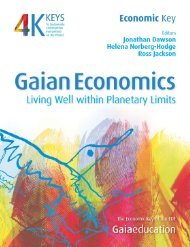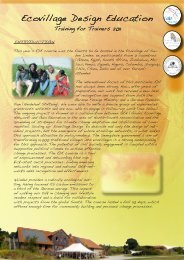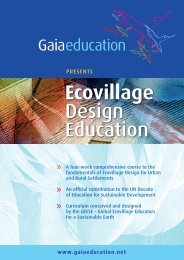Designing Ecological Habitats - Gaia Education
Designing Ecological Habitats - Gaia Education
Designing Ecological Habitats - Gaia Education
Create successful ePaper yourself
Turn your PDF publications into a flip-book with our unique Google optimized e-Paper software.
12 <strong>Designing</strong> ecological <strong>Habitats</strong><br />
1. Adopt far simpler material living standards<br />
2. High levels of self-sufficiency within households, nations and especially<br />
neighbourhoods and towns, with relatively little travel, transport or trade.<br />
There must be mostly small, local economies in which most of the things we<br />
need are produced by local labour from local resources<br />
3. Basically cooperative and participatory systems, whereby local citizens<br />
govern themselves<br />
4. A quite different economic system, one not driven by market forces and<br />
profit, and in which there are far less work, production, and consumption,<br />
and a large cashless sector, including many free goods from local<br />
commons. There must be far lower GDP than at present, and no economic<br />
growth at all<br />
5. Most problematic, a radically different culture, in which competitive and<br />
acquisitive individualism is replaced by frugal, self-sufficient collectivism<br />
The argument here is that these elements are not optional; if our predicament<br />
is more or less as has been sketched, we have to move to these kinds of<br />
practices whether we like them or not. But this need not be a matter of<br />
reluctantly doing what survival requires. Advocates of the Simpler Way<br />
believe that its many benefits and sources of satisfaction provide a much<br />
higher quality of life than most people experience in consumer society (see<br />
Note 4).<br />
As I see it, the principles and designs I have put in terms of the Simpler<br />
Way correspond to those advocated by the ecovillage and permaculture<br />
movements. If there is any significant difference, it is probably only in focus.<br />
I have been most concerned to argue at the whole-system level; for instance,<br />
for the need to get rid of a growth economy, to transcend market systems<br />
and production for profit, to take local control of local economies, and to<br />
move beyond an acquisitive, competitive culture. But when it comes to the<br />
design and functioning of towns, neighbourhoods and households, it should<br />
be obvious that the ecovillage and permaculture movements are pioneering<br />
the essential ways.<br />
Transition Issues: How on Earth do we Get There?<br />
The transition cannot be driven or forced on people by government. The<br />
new local societies can only be built and made to work by the willing efforts<br />
of local people who understand why the Simpler Way is necessary and<br />
who want to live that way because they find it rewarding. Only local people<br />
know the local conditions and social situations so only they can develop the<br />
systems, networks, trust, cooperative climate, etc. that suit them and will<br />
generate enthusiastic and energetic contributions.<br />
Thus, the most important task for people concerned about the fate of<br />
the planet is to help ordinary people where they live to understand the need<br />
for transition from consumer society, and to move toward willing and happy<br />
acceptance of alternative ways. By far, the best way for concerned people







